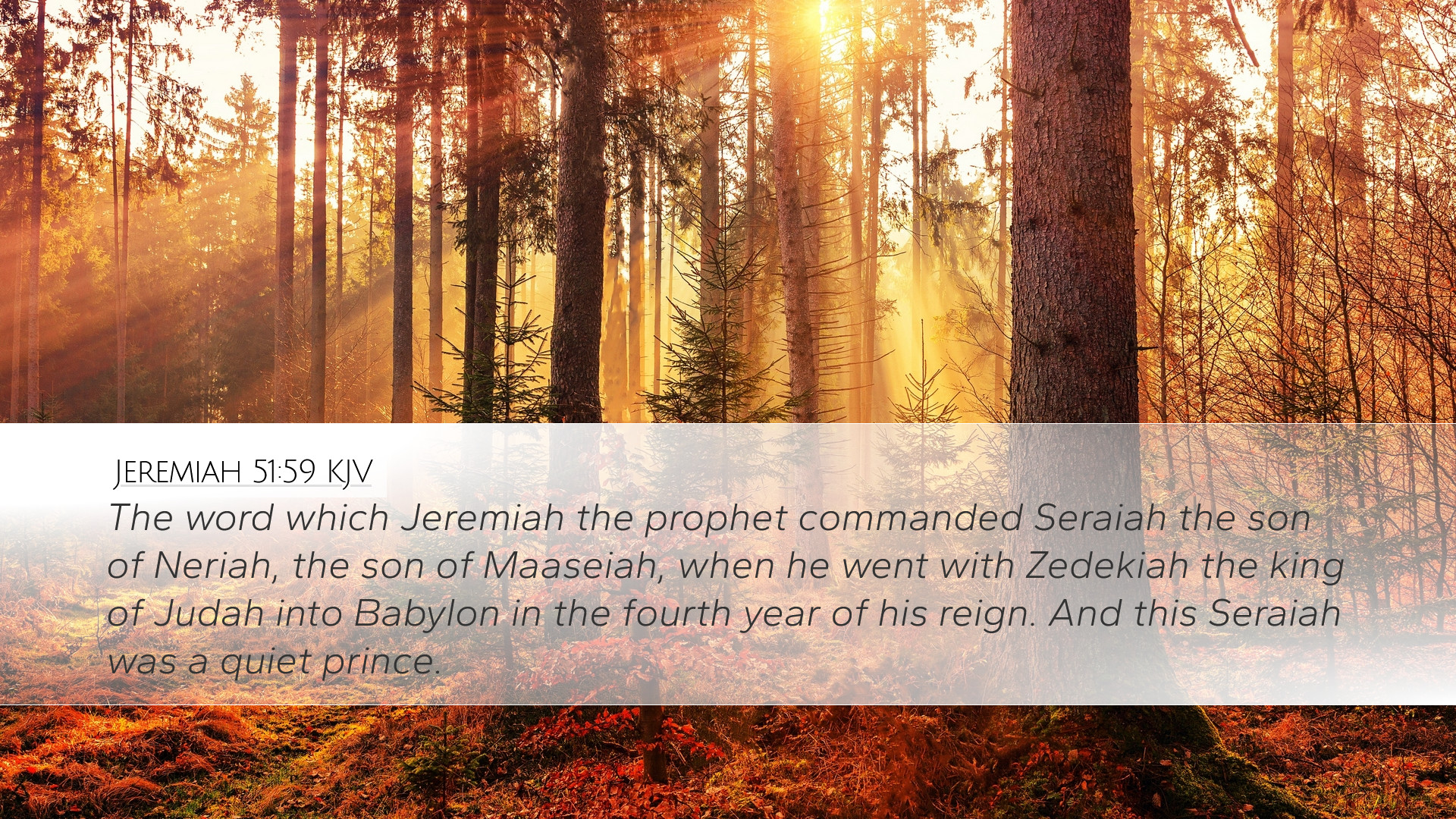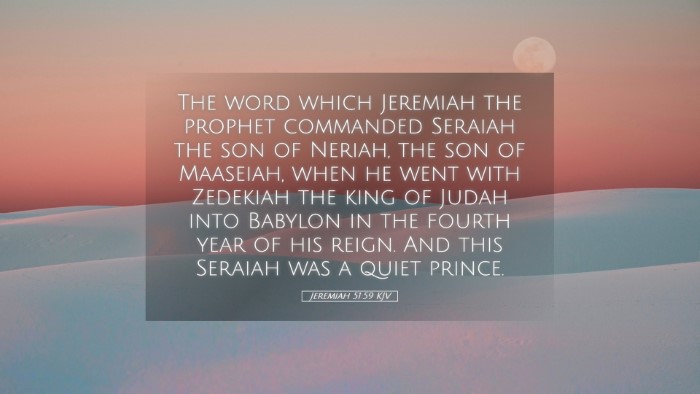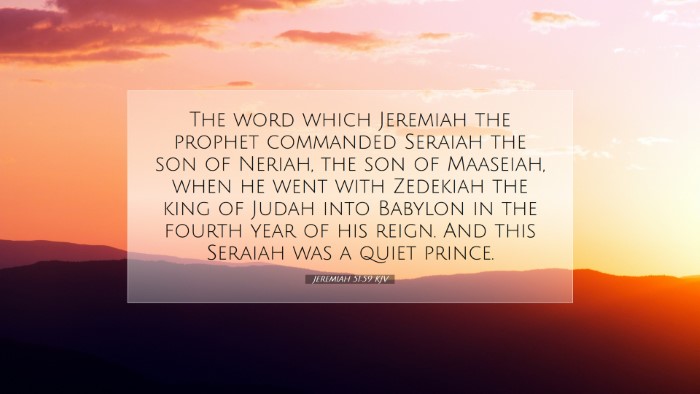Bible Commentary on Jeremiah 51:59
Jeremiah 51:59 (KJV): "The word which Jeremiah the prophet commanded Seraiah the son of Neriah, the son of Maaseiah, when he went with Zedekiah the king of Judah to Babylon, in the fourth year of his reign. And this Seraiah was a quiet prince."
Introduction
This verse occurs within a larger prophecy concerning the fall of Babylon, a central theme in the book of Jeremiah. The mention of Seraiah and his departure with Zedekiah is significant, reflecting the unfolding of God’s plan in history. Commentaries from notable scholars provide rich insights into the implications of this verse.
Historical Context
Understanding the historical backdrop is crucial for interpreting this passage. Jeremiah prophesied during the tumultuous times of the Babylonian exile, warning the people of Judah about impending destruction and exile. Seraiah, mentioned here, is portrayed as a representative figure sent to Babylon, possibly tasked with delivering a message or performing a ceremonial act.
- Babylon's Dominance: The Babylonians were a dominant force, subjugating nations and leading them into exile. Jeremiah’s prophecies were aimed at calling Judah to repentance amidst this overpowering threat.
- Zedekiah's Weak Reign: Zedekiah was the last king of Judah, struggling against the authority of Babylon while void of genuine faith, demonstrating the turbulence of leadership during a time of national crisis.
Character of Seraiah
Described as a "quiet prince," Seraiah embodies a unique blend of nobility and possibly introspection. Matthew Henry notes that his demeanor suggests a man of peace, contrasting sharply with the chaos surrounding his time.
- Significance of His Title: The title of "prince" indicates Seraiah’s noble standing, suggesting he had an important role in the court of Zedekiah and highlights the importance of leadership during national calamity.
- Seraiah's Mission: His journey to Babylon, coupled with Jeremiah's instruction, positions him as a key participant in the unfolding of God's redemptive plan, showcasing the interplay of prophetic guidance and human agency.
Divine Command and Prophetic Action
Jeremiah's command to Seraiah emphasizes the act of prophetic obedience, a recurring theme in the scriptures. Adam Clarke emphasizes the necessity of faithfulness in prophetic duties, highlighting how even one individual can be pivotal in God's overarching narrative.
- The Role of Prophecy: The prophetic message was integral not just in foretelling judgment, but also in providing hope and a framework for understanding God's justice. This underscores the multifaceted role of the prophet in Israel's history.
- Responsibility in Deliverance: The call for Seraiah to fulfill a prophetic mission indicates that God's purposes often require human cooperation, inviting reflection on the responsibilities placed upon leaders and believers alike.
Theological Implications
The mention of Jeremiah’s message holds broader implications for understanding God’s sovereignty and mercy. Scholars like Albert Barnes focus on the dichotomy between judgment and grace, illustrating how the very decree of Babylon's fall resonates with themes of hope amidst destruction.
- God's Sovereignty: The assurance that God is in control even as nations rise and fall is emphasized. The events leading to Babylon's fall are indicative of God's power over human history.
- Encouragement for Believers: The verse encourages believers to trust in God’s promises during distressing times, assuring them that history is guided by divine providence.
Pastoral Applications
For pastors and theologians, this passage offers rich material for soul-searching and congregation encouragement. The themes of prophetic mission, faithfulness to God’s commands, and the assurance of divine authority can be pivotal in preaching and teaching contexts.
- Encouragement in Service: Seraiah's role can inspire church leaders and members to embrace their responsibilities, fostering a sense of importance in every act of faithfulness.
- Trusting in God’s Plan: The generational truths expressed in Jeremiah can serve as a reminder to congregations during uncertain times, inviting them to look beyond present troubles to the faithfulness of God.
- The Purpose of Prophecy in Today’s Context: Reflecting on the nature of prophecy encourages discussions about how God communicates with His people today and the expected responses of faith.
Conclusion
Jeremiah 51:59 serves as a crucial reminder of the interplay between divine sovereignty and human agency. The insights garnered from public domain commentaries invite believers to engage more deeply with the text, examining their roles within God’s unfolding narrative. As pastors, students, and scholars reflect on these themes, they pave the way for deeper understanding and robust faith in a world marked by uncertainty.


